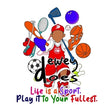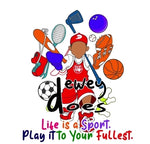How Sports Can Help Kids Develop Problem-Solving Skills
Problem-solving isn’t just for math class. It’s an essential life skill, and kids start learning it long before they hit the workforce. Here’s the exciting part: sports are one of the best ways to teach it.
In sports, every game, every match, and every practice present challenges. Should I pass or shoot? How do I recover after missing a goal? What’s the best strategy for our team to win? These decisions require quick thinking, creativity, and adaptability—skills that translate directly into everyday life.
But it’s not just about the game. It’s about building confidence, resilience, and the ability to navigate challenges in all areas of life. In this article, we’ll explore how sports encourage critical thinking and decision-making, giving kids the tools they need to tackle anything life throws at them. Let’s unpack how the field, court, or pitch can shape future problem-solvers!
How sports teach kids to think on their feet
Sports are dynamic. Every game brings new challenges, and kids are constantly required to adapt. Whether it’s deciding how to outmaneuver an opponent or figuring out how to support their teammates, sports offer endless opportunities to develop problem-solving skills in real-time.
- Quick decisions under pressure: In fast-paced games like basketball or soccer, kids learn to assess situations and act swiftly, honing their ability to stay focused and make smart choices even when time is tight
- Strategic thinking: Team sports often involve planning and executing strategies, teaching kids how to analyze situations, anticipate outcomes, and work collaboratively to achieve goals
- Learning from mistakes: A missed goal or a failed play isn’t the end of the world—it’s an opportunity to reflect, adjust, and try again, fostering resilience and a growth mindset
These moments on the field don’t just build better athletes—they build confident thinkers who are ready to tackle challenges outside of sports too.
Building lifelong problem-solving skills
The problem-solving lessons kids learn in sports don’t stay on the pitch. They carry over into every part of their lives, helping them face challenges with confidence and creativity.
Encouraging kids to reflect on their experiences in sports is key. Ask them questions like, "What would you do differently next time?" or "How did you decide what move to make?" This helps them develop critical thinking and recognize their ability to navigate challenges.
- Collaborating with others: Team sports teach kids to listen, communicate, and compromise—all vital problem-solving skills in relationships and workplaces
- Managing emotions: Handling the highs of a win and the low of a loss helps kids develop emotional regulation, a critical component of making thoughtful decisions
- Applying creativity: In sports, there’s rarely one right answer. Kids learn to think outside the box, finding unique solutions to problems.

Final thoughts on kids' problem solving skills
By supporting their development in sports, you’re not just raising a better player—you’re shaping a future problem-solver equipped to succeed in life’s ever-changing game.
Please note that any advice shared here is general in nature, and we recommend checking in with a professional in regard to your child’s needs.
For more tips and tricks on topics like this deep dive into kids problem solving skills, feel free to contact us or refer to our Dewey Does blog.
Don’t forget, if your whole family wants to look amazing while you’re out there living your best life, we make a whole range of inspiring novelty tees that can add a touch of fun and color. Speaking of fun and color, be sure to check out our super cool interactive logo!
While you’re here, we’d really love to hear what you have to say about kids problem solving skills..Drop us your two cents below.
Hi, Team Does. I get all my sports news and updates from my friend Tommy Ommy, host of Straight from the Basement Sports Podcast. Be sure to follow him wherever you get your podcasts, and check out his YouTube channel for sports news and conversations - Dewey.


Leave a comment